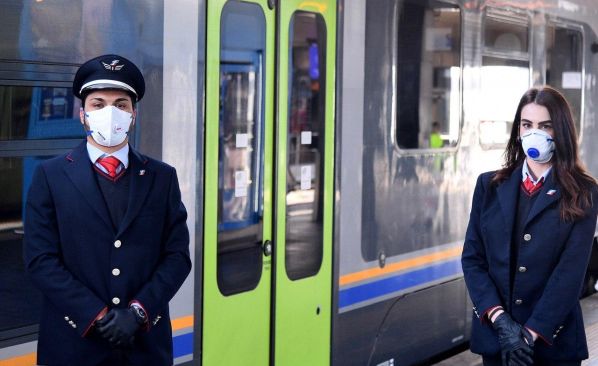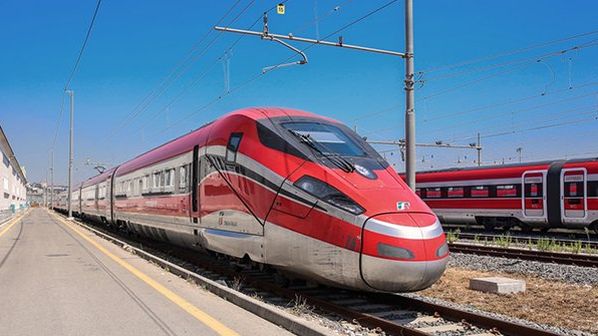Revenue increased by 3% to €12.4bn in 2019, while costs rose by only 2.4% to €9.83bn.
Capital investment increased by 8% in 2019 to €8.1bn. The bulk of the investment (59%) was in railway infrastructure, of which 98% was in the conventional network and 2% in the high-speed network. Road infrastructure investment accounted for 16% of total spending, passenger transport 22% and freight 2%.
Due to favourable ratings of the bonds in FS’ Euro Medium Term Notes programme, FS increased the percentage of bonds as a source of financing from 41% to 49%. This was achieved mainly through additional green bond placements, which FS says are associated with investment projects with significant, certified environmental sustainability.
Net financial debt increased by 15.1% in 2019 to €7.66bn.
New train service contracts were signed in 2019 for the Tuscany, Campania, Marche and Calabria regions as well as to provide rail services in Turin and Emilia Romagna. FS introduced 49 new trains for regional services in 2019 compared with 11 in 2018. “These are the first results of the acceleration of the investment plans that we kicked off in 2018 and that will lead to the progressive upgrade of 80% of the regional fleet within five years,” says FS chairman, Mr Gianluigi Vittorio Castelli.
Freight improvement
FS says that despite the country’s weak economy - industrial production fell by 1.3% compared with 2018 - its Mercitalia rail freight subsidiary has continued to turn its business around by restructuring investments and sharpening its focus on customer needs. FS says freight customers scored 11 out of 15 quality indicators as insufficient in 2018, but by 2019 all indicators were rated as sufficient, with an overall customer satisfaction rating of 7.2/10, compared with 5.9/10 in 2018.
FS set out its sustainability policy and agreed its first long-term goals for 2030-2050 in three key areas: safety, sustainable mobility and carbon emissions. “These are the three pillars on which we will focus our efforts and base daily operations and action plans for tomorrow,” says Castelli.
FS set up a new cyber security operation centre to prevent, detect and fight cyberattacks. FS says it had 10,139 attacks in 2019 - 60% more than in 2018.
A new subsidiary called FSTechnology was established to drive and support digital innovation. It will be responsible for coordinating a €6bn investment programme in technology during the five-year FS business plan. FS also plans to set up FS International to gradually absorb international subsidiaries, units and development activities.
FS recruited 820 additional people in 2019, representing a 1% increase in employees to match the growth in business volumes. Staff turnover was exceptionally high at 19.5% with 9068 hires, creating a much younger workforce. The percentage of employees under 30 increased to nearly 20% in 2019 compared with 13% in 2018 and 9% in 2017. FS also managed to achieve a more balanced geographical distribution of staff.
FS expanded its activities in Europe in 2019 by winning the InterCity West Coast franchise to operate services between London, Birmingham, Manchester and Edinburgh/Glasgow in partnership with First Group. However, the franchise has since been nationalised by the British government in common with all other franchises in response to the coronavirus pandemic. FS will start to operate high-speed services in Spain in January 2022 and says it has made progress for the launch of new high-speed services in France by the end of 2020.
Uncertain future

However, Castelli says FS faces a very uncertain future due to the impact of the coronavirus pandemic. “The health emergency we currently face has shattered the status quo,” Castelli says. “In these uncertain times, not only do the exceptional results and solid financial position presented in our 2019 annual report make us proud of the work we have done, but they are a precious reminder of our group’s vitality and strength as it rises to face the challenges of a previously unimaginable scenario, the consequences of which cannot currently be foreseen.”
FS CEO Mr Gianfranco Battisti is more sanguine. "In this difficult beginning of 2020, FS has launched several initiatives to support the country and is helping to address the Covid-19 coronavirus health emergency, while ready to restart with an extraordinary plan to accelerate investment in rail and road infrastructure of more than €20bn in 2020."
“FS is preparing for the post-pandemic phase with strategies to be adapted to the changes in the way we travel, which will be very different from those of the past. We have developed innovative preventive measures to make passenger health safety a permanent part of travelling,” Battisti says. “It is very important to take immediate steps to identify initiatives to analyse certain dynamics, such as consumer behaviour in their travel patterns, reviewing the customer experience in travel, and making better use of digital channels in order to return to a normal functioning of society and the economy with sustainable growth.”

